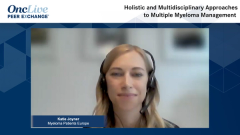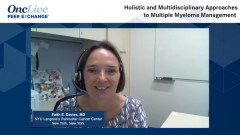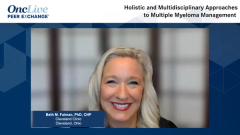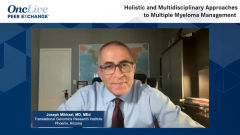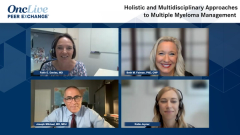
Holistic and Multidisciplinary Approaches to Multiple Myeloma Management
Closing out their program on multiple myeloma, expert panelists consider the role of holistic and multidisciplinary care when managing patients within the current paradigm.
Episodes in this series

Transcript:
Faith E. Davies, MD: Just … moving a little bit further in our discussions, we’ve talked about some of the new therapies, how patients access them or don’t, unfortunately. And … one of the things that we’ve brought up on a few occasions is … the fact that we need a team approach to this kind of treatment, and we need a more holistic approach to this kind of treatment; it’s not just the treatment, it’s the whole. And so, Beth … what are some of the things that you utilize in your practice to ensure that your patients get the optimum care?
Beth M. Faiman, PhD, CNP: One of the things that I utilize is just my ears and listening. So, we have these great, wonderful cutting-edge therapies, bispecific antibodies, CAR T-cell therapies, or maybe it’s just some of the newer oral drugs in the context of a clinical trial. So, you see the patient in clinic, and you review their prognostic information, their disease information and describing and going over this with them, you say, OK, now these are the options available through that shared decision-making approach. Why would you or wouldn’t you be interested in these therapies?
Sometimes they’re just afraid. Sometimes they’re just not able to take the time or they don’t want to go in the hospital. These newer therapies require hospitalization for anywhere from 1 week, 10 days plus in some centers. So, just listening to the patients, finding out what’s important to them, especially if they’ve been heavily pretreated. Maybe they’re at a point where … less is more. They want to travel, so is there an oral therapy you can give so they can see the world, take that medication, and then … just work with them. So, I try to apply the clinical trial data. But I try to tailor it to the patient and listen to what is important to them.
Faith E. Davies, MD: Excellent, thank you ... One of the other … important aspects that we’re learning, particularly as patients are more active and living longer, is the importance of … physical health. So, as you say … yes, we’ve got our therapies, but we need to remember the dreaded bone disease getting in. Surely, patients have got great pain control and use of physical therapy and then also … mental health, because obviously it is a very stressful … environment, and then an emotional help, as well. And so … I’m going to … hand over to Joe for a couple of minutes, really just to think about how you use your multidisciplinary team in … managing our patients.
Joseph Mikhael, MD, MEd: As I like to say, myeloma has always been a team sport and I don’t just say that to get points from Beth because Beth and I work together on so many different programs and even in direct care of patients. But, it really is, by its own definition. We could argue this for just about every disease, but particularly for myeloma … as you just pointed out Faith … [it] affects the bone, affects the kidney. There can be cardiac effects, there can be skin effects. There [are] so many areas. As I often say … we don’t treat myeloma, we treat people. And so, we have to look at them in the greater context. But I would argue that now, even more than ever, with the dawn of these novel therapies, using a little less of the historical … chemotherapy, as it were, and now moving towards immunotherapies and novel approaches like CAR T-cell therapy and bispecifics, the multidisciplinary team has been more valuable and more needed than ever because this engagement with the patient is so much more important.
We’re doing a lot of our work now inpatient. I’m going to predict that over the next few years, we’re going to move much more of this into the outpatient setting, where we’re going to have remote monitoring, where we’re going to engage the patient and their care partner and others to be monitoring certain features. So, having a sense of engaging the patient becomes really important. So, patient communication strategies, the shared decision-making model that Beth referred to is important, but then also the functioning of our own inherent team becomes really important. The communication between the physician, the nurse, the pharmacist, the social worker, the transplant or CAR T or bispecific coordinator. Even to a certain degree now with the community oncologists to ensure as we’re transitioning care because … not all of these patients are going to be treated in academic centers. The goal is to be able to treat them in the community, as well.
So, I know that’s a … “let’s all hold hands and sing kumbaya answer,” but it really is so fundamental that we start thinking this way. It does become a bit of a challenge for the community practitioner [who] may not have access to all of those resources, but we are seeing … a shared resource model for a lot of these community practitioners that they may not have a full-time social worker with them, but on Tuesdays they do, and so on that Tuesday is where they direct that effort. And ... we’re realizing that because of the complexity of the health care system, because [of] the complexity of these new therapies, because of the desire of patients to have a better quality of life and spend less time inside an institution ... that holistic approach is not just a nice option, it’s mandatory. And it is going to lead to better outcomes in the long run. And I would even argue, and I want to be a bit controversial for a second … in the long run that approach is going to be more cost effective because ... it is going to keep people out of hospital more, it’s going to keep people having [fewer] side effects, [fewer] toxicities, as we enhance that collaborative effort together. So, I am I’m a huge fan of that kind of approach, and I really do think it is becoming the standard of care.
Faith E. Davies, MD: That’s great. Katie, from a patient advocacy perspective, [what are your] thoughts on the multidisciplinary team and general wellness for patients?
Katie Joyner: What Joe said, I can’t agree with more. Obviously, the opportunity to have an entire team around the patient to help support them is critical. And you see this in certain health care systems where it works really well and you have access to social workers and nurse specialists and other related support. And then, of course … not every health care system is going to have that. And ... that’s really where a patient organization can help fill some of those gaps for the patients where they might not be able to access some of those specialists, but still need that support and care. So, through patient support groups, through the availability of physical fitness programs or counseling run by patient organizations, education and things like that are really important as well as caregiver support. So, yes … as patients are living longer and having different needs in different areas of life, they will require support from different organizations or specialists.
And it would be great if we had a system that immediately [addressed this]. I’ve heard from some colleagues when they were diagnosed, they were able to go straight to see a counselor who specialized in depression and oncology. That’s really rare, though. Not everyone gets access to a specialist like that. So, we have to be able to fill those gaps where we can.
Faith E. Davies, MD: And Beth, anything you want to … add on this area?
Beth M. Faiman, PhD, CNP: This has been a rich discussion and very important discussion. The general practitioner in most areas can help with that bridging of the gap, but making sure that they understand [the] … medications. I know Joe is very passionate about decreasing the dexamethasone dose, being aware that mood swings are a key component or a key side effect of dexamethasone ... is really important, too. Just a little bit of dex can go a long way for many patients. Also, coordination of care. I just want to put a plug in for the coordination of care between the larger hospital system and the community. Many different areas across the globe [have] access. Not everybody, but many do. And so, if they come to a large hospital institution and Faith says, I want you to take this A, B, or C regimen, whatever works best for you, and then come back to the community oncologist.
And then [use], if you’re able, telehealth. I use a lot of telehealth practices and that really can help that burden of stress, that burden of travel. Who’s going to drive you back and forth? That’s eliminated by just picking up a phone call or having telehealth if that’s available in your area. So, by meeting the patient where they are, not necessarily asking them to come to you ... that really can help the mental [and] physical well-being. They can go out for a walk with their neighbor instead of having to drive 8 hours back and forth to New York, Scottsdale, anywhere in the world to see the specialists.
Faith E. Davies, MD: Thank you so much, Beth, and thank you, Katie and Joseph. It’s been a really great … discussion and ... we … covered the 4 … key unmet needs as I see them anyway, which is around the … diagnosing, around access, [around] inequalities, around … clinical trials and their importance, and then around that whole multidisciplinary team and ensuring that we can really take advantage of all of these new … advances that we have in myeloma. So, thank you for joining me. And I’d also like to thank the audience for being with us. And we do hope that you found this OncLive® Peer Exchange discussion useful and that it hopefully will be valuable for your treatment of myeloma patients. So, thank you everybody so much.
Transcript is AI-generated and edited for readability.


